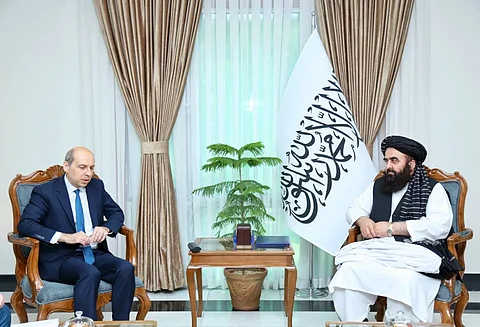

Russia has officially accepted the ambassador appointed by the Taliban-led government of Afghanistan, marking a full normalization of diplomatic relations between Moscow and Kabul. With this move, Russia becomes the fifth country to establish formal ties with the Taliban government since it returned to power in 2021.
According to the Afghan Foreign Ministry, Russian Ambassador to Kabul Dmitry Zhirnov delivered a diplomatic note on Sunday to Acting Foreign Minister Amir Khan Muttaqi, confirming Moscow's acceptance of the candidate proposed by Kabul.
Russia initially established limited diplomatic engagement with the Taliban in April 2022, when it handed control of the Afghan embassy in Moscow to Taliban diplomats and accepted a chargé d'affaires to oversee embassy functions. In a significant step this April, Russia removed the Taliban from its list of banned organizations and expressed readiness to upgrade bilateral relations.
Following that shift, Kabul formally nominated an ambassador to Moscow, a move now accepted by Russian authorities.
Although no country has formally recognized the Taliban-led government, which refers to itself as the Islamic Emirate of Afghanistan, a small but growing number of states have normalized diplomatic relations by accepting Taliban-appointed ambassadors. These include China, Uzbekistan, the United Arab Emirates, and now Russia and Pakistan.
In addition, regional powers such as Iran, Turkmenistan, Turkey, and Kazakhstan have accepted Taliban-appointed chargés d'affaires to manage Afghan embassies in their countries. Taliban diplomats are reportedly operating in at least 10 nations worldwide.
Over the weekend, Afghanistan and Pakistan announced that they too would exchange ambassadors and fully normalize relations. The agreement follows a China-mediated dialogue between the two countries' foreign ministers earlier this month, aimed at de-escalating tensions over border security, cross-border militancy, and trade issues.
With Pakistan’s inclusion, the total number of countries that have fully normalized diplomatic relations with the Taliban-led government now stands at five.
Since the U.S. withdrawal and the collapse of the Western-backed Afghan government in August 2021, the Taliban have faced international sanctions, frozen assets, and economic isolation. In response, the Taliban leadership has actively pursued regional diplomacy and pragmatic ties to break out of its international isolation.
Efforts appear to be gaining traction. Just last month, the World Bank announced plans to reopen its office in Kabul and resume development projects that had been halted following the Taliban’s return to power.
While Western countries remain reluctant to formally recognize the Taliban, this steady trickle of regional normalization suggests that Kabul is regaining limited diplomatic legitimacy—at least among key neighbors and global powers seeking geopolitical influence in Central and South Asia.